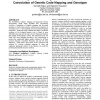Free Online Productivity Tools
i2Speak
i2Symbol
i2OCR
iTex2Img
iWeb2Print
iWeb2Shot
i2Type
iPdf2Split
iPdf2Merge
i2Bopomofo
i2Arabic
i2Style
i2Image
i2PDF
iLatex2Rtf
Sci2ools
131
click to vote
GECCO
2007
Springer
2007
Springer
Learning recursive programs with cooperative coevolution of genetic code mapping and genotype
The Probabilistic Adaptive Mapping Developmental Genetic Programming (PAM DGP) algorithm that cooperatively coevolves a population of adaptive mappings and associated genotypes is used to learn recursive solutions given a function set consisting of general (not implicitly recursive) machine-language instructions. PAM DGP using redundant encodings to model the evolution of the biological genetic code is found to more efficiently learn 2nd and 3rd order recursive Fibonacci functions than related developmental systems and traditional linear GP. PAM DGP using redundant encoding is also demonstrated to produce the semantically highest quality solutions for all three recursive functions considered (Factorial, 2nd and 3rd order Fibonacci). PAM DGP is then shown to have produced such solutions by evolving redundant mappings to select and emphasize appropriate subsets of the function set useful for producing the naturally recursive solutions. Categories and Subject Descriptors I.2.8 [Artificia...
| Added | 16 Aug 2010 |
| Updated | 16 Aug 2010 |
| Type | Conference |
| Year | 2007 |
| Where | GECCO |
| Authors | Garnett Carl Wilson, Malcolm I. Heywood |
Comments (0)

